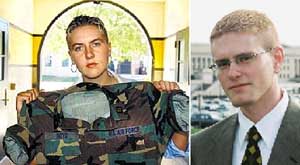-
- Civil unions author lauds California DP bill
- Constitutional marriage amendment debated in U.S. Senate
- Ban predicted in Mass. if high court legalizes gay marriage
- ROTC student loses $40,000 over ‘don’t ask, don’t tell’
- Supreme Court asked to grant custody to lesbians
- Merck testing AIDS vaccine on humans
- Durham first N.C. county to offer same-sex bennies
- University allows antigay web log on school’s server
- National News Briefs
- World News Briefs
national
ROTC student loses $40,000 over ‘don’t ask, don’t tell’
Antigay witch hunt continues to drain military of millions
Published Thursday, 11-Sep-2003 in issue 820
BOULDER, Colo. (AP) — Being in the military taught Mara Boyd a sense of integrity, pride and camaraderie that she wholeheartedly embraced, she says.
She learned the values that define her after she came to the University of Colorado in 1998, straight out of high school on a three-year scholarship from the Air Force ROTC.
But the summer after her sophomore year, just after graduating with distinction from ROTC’s version of basic training, she discovered another aspect of her self-definition while hanging out with friends in her home state of Michigan.
“I started feeling stuff I’d never felt before,” Boyd said. “I fought it all summer, but I came back to school realizing I was a lesbian.”
After a year of referring to her girlfriend, Nicole, as “Nick” and dodging the matchmaking efforts of fellow cadets, she “came out” to her commander and was discharged last fall.
She lost an appeal against the discharge this summer and will have to pay back $30,990 to the ROTC.
Like an estimated five percent to eight percent of military service members, Boyd had “served silently” through her junior year, keeping her sexual orientation a secret to abide by the 10-year-old “don’t ask, don’t tell” law.
But she said the policy — which has dictated the discharge of nearly 10,000 service members in the past decade — is a torturous double standard for people ingrained with a sense of honesty.
Boyd, 21, said she struggles to comprehend that she has lost her dream of serving in the military. She left CU and is working full-time as a gardener to repay her scholarship money.
“It’s hard for me to wrap my mind around such discrimination,” she said. “All of my accomplishments were valid before I said I was a lesbian, but five seconds after, I’m not fit to serve.”
Opponents of the law cite harassment, proactive investigations into homosexual conduct and the absence of rights for gay members’ partners.
CU’s Air Force ROTC program forwarded questions on the policy to national headquarters, which deferred comment to the Department of Defense, whose spokesperson, Maj. Sandra Burr, would not comment.
“It’s a law that we follow,” she said. “We don’t discuss the pros and cons of a law.”
But she later released a list of key points behind the policy, which says “a service member’s sexuality is considered a personal and private matter.”
It’s not that simple, said Steve Ralls, spokesperson for Servicemembers Legal Defense Network, which provides free legal services to military personnel affected by “Don’t ask, don’t tell.”
Ralls said parents have been questioned about their children’s sexual orientation during discharge investigations. And military doctors and psychiatrists have been known to turn in gay service members after learning of their sexual orientation during the course of medical treatment, Ralls said.
The military spent more than $250 million investigating same-sex, sexual conduct, and the discharges have cost the military several highly trained professionals, he said. For example, he said more than two-dozen linguists trained in Arabic, Farsi and Korean have been discharged for homosexuality in the past year.
“That’s costing the military the talents of those men and women and is having a very serious impact on national security,” Ralls said. “These are helicopter pilots, linguists, doctors — people that the military needs.”
The Department of Defense list points out that the number of “those discharged for choosing to violate the policy” has remained steady for four years at six-tenths of one percent of overall discharge rates.
It says the department tries to administer the law in a fair and consistent manner and conducts training to eliminate harassment. The list states: “While one case is too many, the anecdotal evidence collected by SLDN is not representative of the prevailing climate in the Armed Forces.”
In passing the law, Congress expressed concern that gay sex poses a risk to morale, good order, discipline and unit readiness, the list says.
Ralls and Boyd dismissed that idea, saying that prejudice against gays would diminish if they weren’t treated as “second-class citizens.”
Boyd said she never wanted to wear a rainbow flag on her uniform or talk to her colleagues about sex — she just wanted to follow the core values and have job security.
That’s not something “don’t ask, don’t tell” allows, she said.
“It’s not just we won’t ask and you shouldn’t tell,” she said. “You have to lie. You have to deceive. You have to create the illusion that you are heterosexual.”
|
|
Copyright © 2003-2025 Uptown Publications


